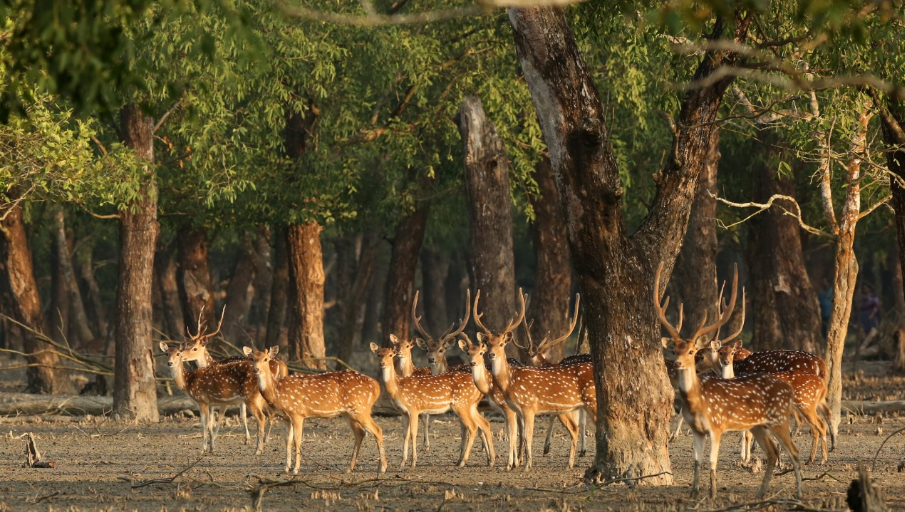
Protecting biodiversity means saving humanity
Every morning, citizens of Dhaka used to wake up engulfed in traffic noise and loud honking. But thanks to the lockdown, our days are now starting with sweet chirping of birds and blowing of cleaner breezes. Since March 2020, due to the coronavirus pandemic, this is the “new normal.”
All over the world, people are fighting with an unseen enemy — the coronavirus. While human beings decided to stay at home and isolate themselves, nature is responding and restoring in its own way.
Dolphins, turtles, and red crabs are now playing at the empty seashore at Cox’s Bazar. It is reported that dune vegetation is back on the seabed. All over the world, we are witnessing similar events. Sea lions in Ecuador, deer in Paris, a civet cat in Kerala, a puma in Santiago, Chile. It is pointing out towards us how one species in nature, the human being, impacted the freedom of all the others. Our existing growth-focused economic system has wreaked havoc on nature.
Globally, one million species are at risk of extinction due to anthropogenic activities. Biodiversity loss and ecosystem collapse are ranked as two of the top five threats humanity will face in the next ten years, according to the Global Risk Report 2020 by World’s Economic Forum.
This biodiversity loss and ecosystem collapse are directly linked with the ongoing pandemic situation. This zoonotic virus is now spreading into nature and attacking us since we are destroying the habitat of its natural host and becoming exposed to various pathogens.
Since the 1980s, the number of emerging outbreaks of infectious disease has more than tripled and more than two thirds of these diseases originate from wild animal. In ecosystem, every species has its own role which keep the ecosystem in a state of balance. Replacing one species with others has huge impact on disease risk. When one species is out of balance, others follow the same fate.
The outbreak of dengue is one such example. We all know, guppy fish and frogs used to eat mosquito larvae, while crows eat garbage and Bengal vultures used to eat dead animals and bird flesh.
Now, Bengal vultures are disappearing, and we are among the worst sufferers of dengue. Nipah virus emerged from bats. Deforestation drove them from their habitats to homestead fruit gardens. This is the reason, the “One Health” concept became important. The health of human beings, wildlife, and the ecosystem are closely linked with each other.
We need to reconsider or redesign our linear economic system. In the midst of economic crisis due to lockdown conditions, we need to think about biodiversity and the natural ecosystem. We are heavily obsessed with market-based and profit-driven economic models without paying due attention towards the cost on nature.
Whatever the profit is, at a certain peak point it will collapse. The spread of coronavirus is a burning example of such a scenario. Everything is on hold now. Many countries are now slowly easing lockdown. But when the lockdown is lifted, people will need to jump into economic activities to stay afloat amid a deep recession.
A massive transition in our economic system is necessary to avoid future pandemics. This is high time to think about a well-being-led and circular economy rather than the growth-led linear economic model.
The United Nations has announced May 22 as the International Day for Biological Diversity to promote understanding and awareness about the importance of biodiversity among the people and society. This year’s slogan “Our solutions are in nature” emphasizes hope, solidarity, and the importance of working together at all levels to build a future of life in harmony with nature.
As we observe this day, we should look to the future with focus on nature-based solutions. There are a number of measures that should be adopted across sectors. Emphasizing nature-based solutions in all the development sectors through its inclusion in upcoming 8th five-year plan (July 2020-June 2025) could be an important step for Bangladesh.
We also need to prepare a biodiversity finance plan to identify and prioritize a mix of suitable biodiversity finance solutions to reduce the biodiversity finance gap.
We should immediately take a crash program to implement the National Biodiversity Target which is set in our National Biodiversity Strategy and Action Plan. And the clock is ticking fast, as we need to implement it by 2021.
The Bangladesh parliament with support from its Parliamentary Standing Committee on Environment could make a strong political commitment on implementation of the Planetary Emergency that was declared in November 2019, which includes both climate change and biodiversity.
We should consider temporarily or seasonally banning access of tourists or visitors for some periods into all of our parks, protected areas, ecologically critical areas, important sea beaches, and coral islands, which will support regeneration of wildlife and will support them for free movement for mating and breeding.
We should similarly promote urban biodiversity and green urbanization. City mayors can explore ways and coordinate relevant agencies (eg Forest Department) to incorporate arboriculture into the city’s physical structure.
Our economic model should give much more emphasis to our natural capital by ensuring sustainable use of it. Reducing deforestation, biodiversity degradation, and considering the environmental cost along with responsive consumption, redesign of our growth model should get priority in our development interventions.
Sometimes de-growth, divestment, and decarbonization are also good for ensuring the future of humanity and healing of the planet.
A peaceful coexistence of humans and wildlife is possible, provided appropriate management tools, public policies, and societal support are present. The 2020 is the year, when more than ever, the world can commit to a strong global framework that will “bend the curve” on biodiversity loss for the benefit of humans and all life on Earth. Our Earth can heal herself, our duty to our home is to help the healing process. We just need to adjust our rhythm to the nature’s beat.
Article Credit: dhakatribune
